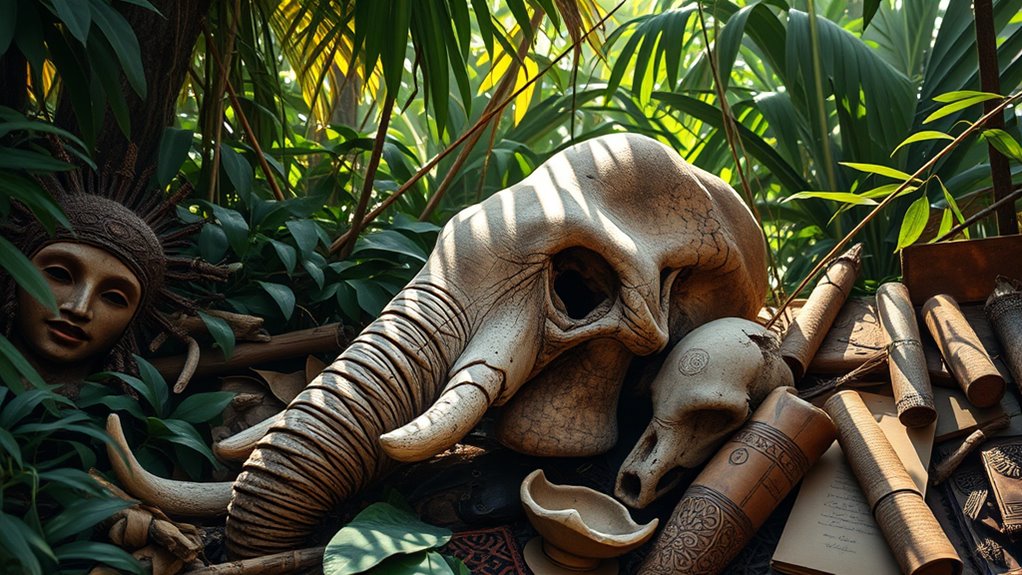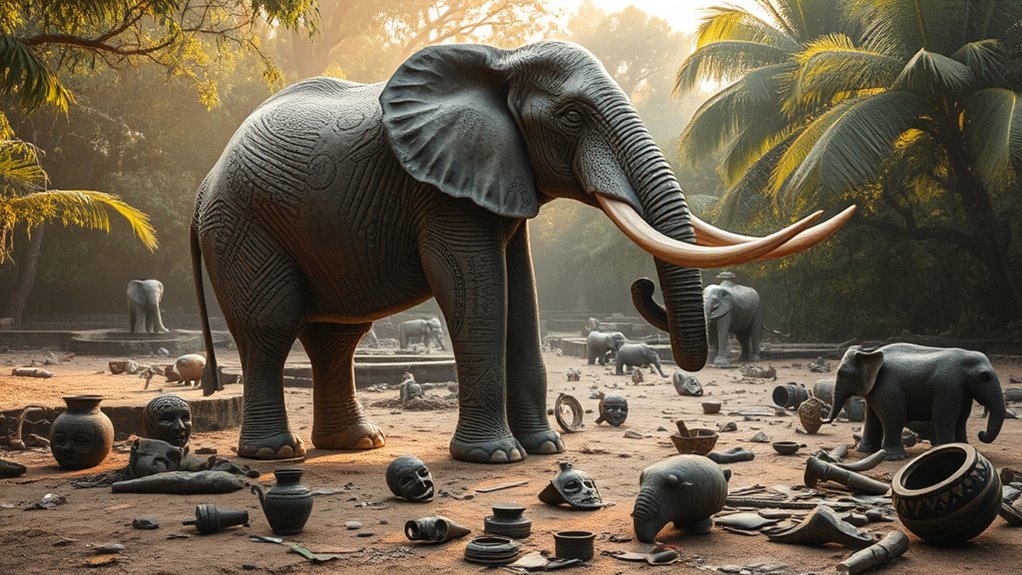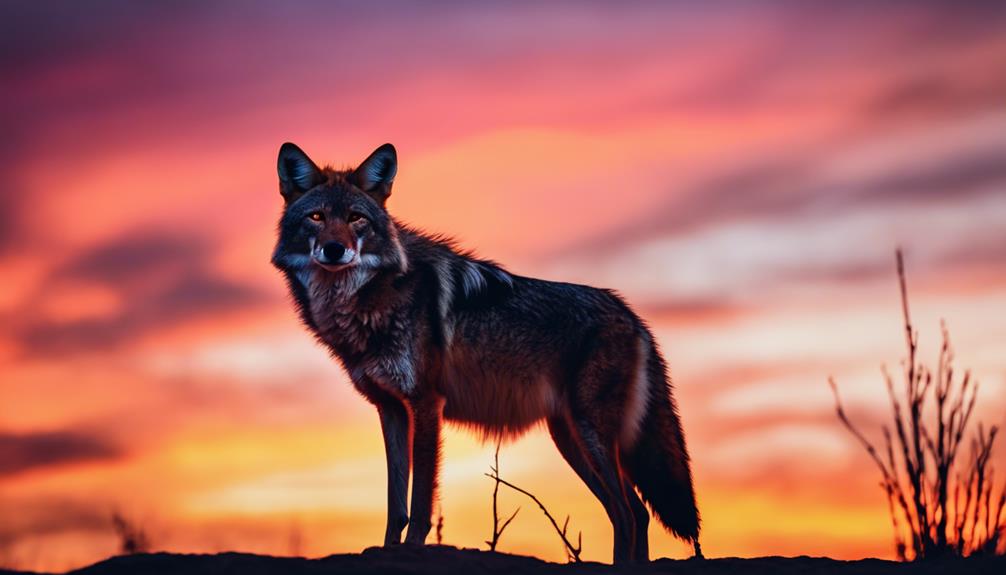Elephants symbolize memory, wisdom, and strength across many cultures, representing virtues like patience and resilience. In Asian traditions, they’re linked to divine figures like Ganesha, embodying prosperity and spiritual authority, while in African cultures, elephants reflect community bonds and social cohesion. Globally, they serve as icons of resilience and collective history, often standing as symbols of cultural identity and reverence. Exploring their rich symbolism reveals how they continue to inspire respect and conservation efforts worldwide. Keep going to uncover the deeper stories behind their legendary significance.
Key Takeaways
- Elephants symbolize memory, wisdom, patience, and resilience across diverse cultures worldwide.
- In Asian traditions, they are sacred animals linked to spiritual authority and prosperity.
- African cultures view elephants as symbols of community, social bonds, and strength through folklore and rituals.
- Globally, elephants represent collective memory, virtues, and influence societal and spiritual beliefs.
- Contemporary significance emphasizes conservation, respecting elephants as cultural icons embodying enduring qualities.

Throughout global lore, elephants symbolize memory, wisdom, and strength, embodying qualities that resonate across cultures. When you think about elephant symbolism, you’re tapping into a universal image that represents more than just physical power. It’s a reflection of deep-rooted cultural significance, often linked to qualities like patience, intelligence, and longevity. Different societies have long regarded elephants with reverence, viewing them as creatures that carry the weight of history and tradition. This reverence isn’t accidental; it stems from the elephant’s remarkable memory and social intelligence, traits that have impressed humanity for centuries. As you explore how elephants are portrayed around the world, you’ll notice how their symbolism often embodies stability and resilience, qualities that cultures have admired and aspired to.
In many Asian cultures, especially within Hindu and Buddhist traditions, elephants hold a special status. You might recognize the revered figure of Lord Ganesha, the elephant-headed deity, symbolizing wisdom, prosperity, and the removal of obstacles. This highlights the cultural significance attributed to elephants as divine beings or sacred animals. Similarly, in Southeast Asia, elephants are seen as symbols of royal power and spiritual strength. They’re often associated with kings and warriors, representing authority and protection. When you consider these traditions, it’s clear how deeply elephant symbolism is woven into societal values and religious beliefs. It’s not just about physical strength but about embodying a moral and spiritual authority that guides communities. Moreover, the symbolism of elephants extends into contemporary conservation efforts, emphasizing their importance as majestic creatures deserving protection and respect.
In African cultures, elephants are equally essential. They symbolize community and family, thanks to their social behavior and strong bonds within herds. You might notice how stories and folklore highlight their intelligence and social cohesion, reinforcing the idea that strength is rooted in unity and collective memory. The elephant’s cultural significance here goes beyond symbolism—it influences rituals, ceremonies, and even conservation efforts. When you see elephants revered in African art or storytelling, it reflects a broader acknowledgment of their role in shaping social harmony and cultural identity.
Across the globe, the common thread remains that elephants symbolize more than just their physical attributes. They epitomize a collective memory—an enduring symbol of history, wisdom, and resilience. As you explore various cultural contexts, you realize how this symbolism is woven into the fabric of human history. The elephant’s cultural significance extends beyond myth and legend; it influences values, spiritual beliefs, and societal structures. Whether regarded as divine messengers, royal symbols, or community icons, elephants continue to remind us of the importance of memory, strength, and wisdom in shaping human experience.
Frequently Asked Questions
How Do Elephants Contribute to Their Ecosystems Beyond Memory?
You might not realize it, but elephants play a crucial role in their ecosystems beyond memory. Their migration patterns help disperse seeds across vast areas, promoting forest regeneration. As they move, they create pathways that other animals use, and their foraging habits maintain open landscapes. By doing so, elephants support biodiversity, shape habitats, and guarantee healthy ecosystems, making them indispensable for the environment’s balance and resilience.
Are There Cultural Taboos Related to Elephants’ Memories Worldwide?
Imagine you’re in a world where elephants hold memories like ancient smartphones. You’ll find that many cultures have elephant superstitions and show cultural reverence, but some also hold taboos. For example, in certain regions, harming elephants is taboo due to their spiritual significance. These beliefs shape behaviors, reflecting respect or fear rooted in deep-seated traditions. You must recognize how these cultural taboos influence how societies honor or avoid elephants.
What Scientific Studies Support Elephants’ Long-Term Memory Capabilities?
You might wonder what scientific studies back elephants’ long-term memory. Researchers use cognitive testing to assess their abilities, revealing impressive recall over years. Neural mechanisms, like the hippocampus and amygdala, play vital roles in encoding and retrieving memories. These studies show elephants recognize kin, remember water sources, and respond to past threats, confirming their remarkable memory skills through consistent scientific evidence.
How Do Elephants’ Memories Influence Their Social Structures?
You see, elephants’ memories greatly influence their social structures through their remarkable ability to remember past experiences and locations. Their memories preserve essential information like water sources and safe paths, which they communicate to others. Elephant communication relies heavily on these memories, helping the herd stay connected and cohesive. This long-term memory fosters trust, cooperation, and leadership within their social groups, ensuring survival and social stability over time.
Can Elephants’ Memories Be Compared to Human Collective Memories?
You wonder if elephants’ memories mirror human collective memories. Think of elephant symbolism representing wisdom and remembrance. Like memory retention techniques, elephants hold onto essential cues from past experiences, influencing future behaviors. While humans build collective memories through shared stories, elephants remember critical survival details and social bonds. Both showcase remarkable recall, but humans create complex cultural memories, whereas elephants rely on instinctual and learned memories rooted in their environment.
Conclusion
As you reflect on the elephant’s place in global lore, you realize it’s like a vast, living library filled with stories and memories. Its symbolism reminds you of the importance of wisdom, strength, and memory across cultures. Just as an elephant’s memory never fades, neither should the lessons we carry forward. So, next time you see one, remember you’re witnessing more than an animal—you’re glimpsing a keeper of timeless stories.










